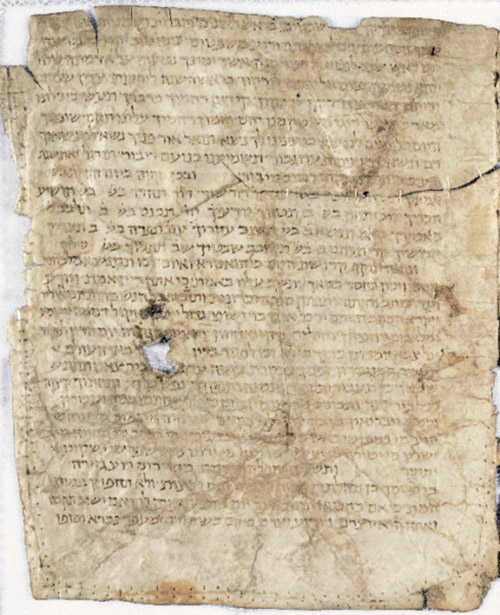
Yannai was one of the great liturgical poets who flourished in the Land of Israel in either the sixth or seventh centuries. For many years, most of his poetry was thought to have been lost. This changed with the gradual discovery of numerous fragments from the Cairo Genizah at the turn of the 19th century.
In 1937, the scholar Menachem Zulai (formerly Billig) published a collection of his poetry recovered from the Genizah (see http://hebrewbooks.org/39280).
All in all, 167 piyutim of Yannai that were centered around the weekly Torah portion (according to the three-and-a-half-year cycle that was practiced in Eretz Yisrael) were discovered. Eight hundred other pieces of his poetry on different themes were also found.
In 2010, Dr. Laura Suzanne Lieber published an excellent annotated selection of Yannai’s “Qedushtaot” (a Qedushta was the section of liturgical poetry recited in Eretz Yisrael congregations during the beginning of the Amidah at the Sabbath morning services. It was arranged according to the weekly Torah portion) on the book of Genesis (you can find the book here https://press.huc.edu/yannai-genesis-invitation-piyyut/#.YU0j-qhAr8k).
Many of Yannai’s verses are based on Genesis Rabbah—the earliest of the midrashic corpus. Reading this poetry often gives us Yannai’s unique take on any given topic.
This week marks the beginning of the book of Genesis. Here are some interesting excerpts from Dr. Lieber’s fascinating study of the poet and his creations:
*Yannai on the creations of the 4th day*
סהר מחווה דעת לילה ויום, גדולה ליושב בסתר עליון
The moon proclaims knowledge, night and day, ascribing greatness to the One who dwells in secret on high.
This is in all likelihood connected to a passage in Genesis Rabbah 6:3, “R’ Nachman said: Esau [a byword for Rome] counts by the sun, which is large: just as the sun rules by day but not by night, so does Esau enjoy this world, but has nothing in the World to Come. Jacob [by contrast] counts by the moon, which is small; just as the moon rules by day and by night, so too has Jacob a portion in this world and in the World to Come.”
This may be a hidden anti-Byzantine polemic that casts the Jewish lunisolar calendar against its gentile solar counterpart.
*Adam is saved by the Sabbath*
ועוד בשישי יצרת אדם מן האדמה, וכאחד מבני אלים נדמה וחטא, ולדין הובא באימה, ובשתים עשרה עם דמדומי חמה קדמה השבת..ודינו נגמר לעבוד את האדמה, ומזמור שיר ליום השבת להנעימה, וגם להודות לצייר, אשר פעולתו שלימה
On the sixth day You created human from the earth, and like one of the Divine things he seemed, but he sinned..and to judgment he was brought in terror, and in the 12th hour, at the setting of the sun, the Sabbath approached [and alleviated his guilt], and his sentence was tempered: to work the land, and “a hymn: a song for the Sabbath day,” to sweetly sing and also “to give thanks” to the Artist Whose works were thus perfected.
This is based on the midrash on Psalms 92:3 where as God is about to destroy Adam and Eve after the eating from the fruit of the tree of knowledge, the Sabbath intervenes, stating: “At that moment arrived and became Adam’s advocate saying..’ During the 6 days of creation no one suffered punishment, and you will begin with me? Is this my holiness? Is this my rest? And thus Adam was saved by the Sabbath’s pleas from destruction in Gehinnom.
Also, according to Kohelet Rabbah, the song for the Sabbath day (Mizmor Shir L’yom HaShabbat) was composed by Adam in thanks for the Sabbath day for interceding on his behalf.
*An abundance of light on the Sabbath*
ויום שביעי בירכת וקידשת, ובו נחת ונפשת, ויום מימים אותו פירשת, וערב בו לא האמשת, ובראש..פירשת, כי באור אותו העשרת,
And the seventh day You blessed and hallowed, and on it you rested and were refreshed, and that day from all others You separated it, and as for its evening, You never let twilight set in, and as the first [of all holidays], You described it, for with light You enriched.
The Midrash records that the curses on Adam and Eve, which according to Genesis Rabbah included the diminution of the heavenly luminaries, didn’t begin to take effect until after the Sabbath’s end. Thus they did not know darkness until after the end of the seventh day. When the first Sabbath ended, so did humanity’s place in the garden. The kindling of the Shabbat candles as well as the Havdalah ceremony are both connected to this primeval episode.
To be continued…
The author is a founding director of Channeling Jewish History (for more on that see https://www.facebook.com/groups/2213868834 ). He can be contacted at [email protected].













